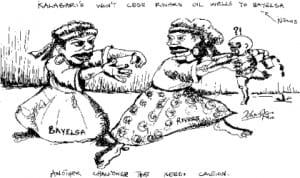Editorial
Beyond The JTF Terror Alert
 The failure of the Joint Task Force (JTF) to ensure a crisis-free aid-el-Kabir celebration last week, following the bombing of St. Rita’s Catholic Church in Kaduna has tended to raise more questions than confidence in the operations of the security outfit.
The failure of the Joint Task Force (JTF) to ensure a crisis-free aid-el-Kabir celebration last week, following the bombing of St. Rita’s Catholic Church in Kaduna has tended to raise more questions than confidence in the operations of the security outfit.
The Joint Task Force alerted Nigerians of plans by some fundamentalists to attack a variety of targets and promised to make the period of the Muslim festival safe. While the alert is very commendable, time has shown that it only confirmed the credibility of the intelligence and gave people a false sense of safety.
Indeed, many Nigerians were waiting to see a peaceful Sallah and to commend the security agencies for being able to ensure safety within a specific period for the first time. This is more so, because alerts like the one given were not only rare but assuring.
But when a suicide bomber got a smooth sail to St. Rita’s Catholic Church in Kaduna and killed another batch of innocent Nigerians at a time when the security agencies were supposed to be on their greatest period of alert, is un-acceptable.
We want to believe that the promise to provide security for the festival was not to protect only the Muslims that would worship in the open, but for all Nigerians. But knowing the mode of the attack over the years, the security agencies should have known who was most likely to be attacked.
Clearly, if the Military had taken any time to study the trend, they should have identified the flash points and devised ingenious ways of dealing with attacks in areas such as, a Church at worship in a place like Kaduna.
Once again, the JTF has failed to prove to the nation that the safety of Christians in the Northern part of Nigeria can be assured. They lost the opportunity to use the intelligence at their disposal to the fullest advantage. They have also squandered the confidence of the people generated during the Muslim festival.
We are however not unmindful of the possible benefits of the alert and the deterrence it provided. It is also possible that more places would have been struck without the efforts of some agents of the Task Force. But until the security agencies are able to get it right, especially at times like the one that was exploited by the insurgents, safety cannot be said to be anywhere yet.
The Tide welcomes the timely release of alert whenever necessary to prepare society against any attack and, perhaps to win terror through the elimination of surprise and intimidation by some spineless elements in the society. This would also show that the State is not content with only counting its loses after every attack.
If the security agencies will further fine-tune their intelligence capabilities and reasonably involve the general public in fighting terror, Nigeria is likely to go beyond the meaningless condemnation of attacks and killings after the worst may have happened every now and then.
As the year draws to an end, the need for greater synergy within the security agencies and between the people have become more imperative, More than other times, people will gather for parties, meetings and the likes, their safety must be ensured. There must be visible security presence at markets, banks, churches, schools, government offices and other public places.
While we have no doubt that the proper empowerment of the security agencies are being addressed, the failure of the state to openly indict or prosecute any key figure that may be sponsoring the Boko Haram group in Nigeria does not speak too well of the safety of this country, This is more so when useful leads are exposed every now and then.
Although the activities of the group are alleged to enjoy some foreign backing, the intelligence community can help Nigeria to root-out the group if the search light would be brought to bear on possible sponsors of the group within the country first. But until then, the pressure should be on the security agencies that must be able to gather intelligence on credible threats and have the commensurate strategy, tack and resources to quell same.
Editorial
As NDG Ends Season 2

Editorial
Beginning A New Dawn At RSNC

Editorial
Sustaining OBALGA’s Ban On Street Trading

-
Maritime4 days ago
Nigeria To Pilot Regional Fishing Vessels Register In Gulf Of Guinea —Oyetola
-

 Sports4 days ago
Sports4 days agoGombe-Gara Rejects Chelle $130,000 monthly salary
-
Maritime4 days ago
Customs Declares War Against Narcotics Baron At Idiroko Border
-

 Sports4 days ago
Sports4 days agoTEAM RIVERS SET TO WIN 4×400 ” MORROW” …Wins Triple jump Silver
-
Maritime4 days ago
NIMASA,NAF Boost Unmanned Aerial Surveillance For Maritime Security
-

 Sports4 days ago
Sports4 days agoNPFL Drops To 91st In Global League Rankings
-

 Sports4 days ago
Sports4 days agoNIGER DELTA GAMES PANACEA TO YOUTH DEV”
-

 Sports4 days ago
Sports4 days agoNPFL Impose Fines On Kwara United Over Fans Misconduct

